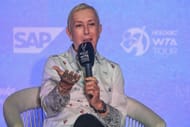Martina Navratilova once shared her feelings about fleeing her birth country, Czechoslovakia, in 1975 at the age of 16. She said she never felt like she belonged anywhere until she arrived in the United States.
Navratilova is one of the greatest women's tennis players, with a total of 59 Major titles: 18 in singles, 31 in doubles, and 10 in mixed doubles. She also held the top spot in the WTA rankings for 332 weeks, among other achievements.
However, her success came at a cost. Navratilova had to leave Czechoslovakia as a teenager due to issues with the communist regime. She settled in the USA for better opportunities and gained American citizenship in 1981.
In her autobiography, published in 1985 in collaboration with New York Times sportswriter George Vecsey, Martina Navratilova wrote that her stubborn and independent nature made her relate more with Americans than with the people of her home country.
"I was so stubborn, so independent, that I was more American than Czech, even as a little kid," the Czech-born American wrote.
"I didn't feel I belonged anywhere until I came to America for the first time when I was 16. I'm not a mystic about many things -- I tend to be pretty pragmatic about life -- but I honestly believe I was born to be American," she added.
Martina Navratilova: "I am just sorry my own mother had to live under that regime"

Fleeing her own country and settling in the US came at a cost for Martina Navratilova. She was stripped of her Czechoslovakian citizenship, and her family wasn't allowed to visit her for four years because it could have led to her detention.
It wasn't until 1979 that her mother, Jana, was able to travel to the UK to watch her win the Wimbledon Championships. It took several more months for her to be reunited with the rest of her family.
In a 2003 interview with The Guardian, Navratilova lamented how her mother and others from her generation were denied so much under communist rule. The 18-time Grand Slam champion also considered herself fortunate to have escaped that situation as soon as possible.
"I still feel it today when I look at my mother and her friends. It's the same for anyone there in their 60s or 70s or 80s. They were denied so much. I am just sorry my own mother had to live under that regime for most of her life," Martina Navratilova said.
"I was lucky. I got out and, 14 years later, Czechoslovakia became a free country. So I feel anger, even fury, at this bloody system that ruined so many people's lives for no reason whatsoever," she added.
